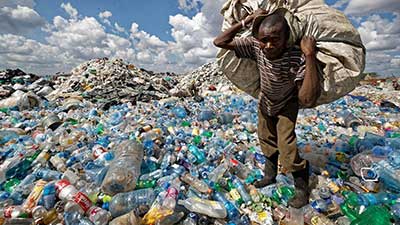Relevance: GS-3: Conservation, environmental pollution and degradation, environmental impact assessment
Key phrases: UNEP, Sustainable Financing Mechanism, Montreal protocol, Minamata convention, biomagnification and bioaccumulation, Plastic Waste Management Amendment Rules, 2021, Section 5 of Environment (Protection) Act, 1986.
Why in News?
- Recently, one hundred and seventy-five countries have agreed to a legally binding global treaty to end the plastic pollution crisis by tackling the plastic's entire supply chain.
- According to UNEP, it is the “biggest multilateral environmental deal” since the 2015 Paris climate agreement.
- Countries already passed a resolution on the treaty to directly tackle the 9 billion tonnes of plastic produced since the plastic age ramped up in the 1950s. Work now begins on how to implement the treaty by 2024.
Key points:
- Peruvian holistic approach vs Japanese selective-focussed approach:
- Two competing ideas had been put forward. One, led by Peru and Rwanda, encompassed all stages of plastic’s life cycle, from production to consumption and disposal.
- The second was a far more limited deal focused on plastics in the oceans, recommended by Japan.
- The deal that has emerged supports the Peruvian holistic approach. Crucially, elements of the treaty are legally binding.
- Sustainable Financing Mechanism: Treaty acknowledges that lower-income countries will find it harder to grapple with plastic pollution than high-income ones and so the treaty asserts some sort of financing model to help curb plastic use and waste.
Why does the world need such a treaty?
- Past successful environmental treaties:
- UNEP compared the accord to past environmental treaties such as the Montreal protocol on ozone-destroying chlorofluorocarbon (CFCs) and the Minamata convention on mercury pollution, both of which led to massive reductions in emissions of these harmful chemicals.
- Global treaties are proof that global deals can make governments and industry work differently.
- UNEP: Catastrophic health Consequences, if further delayed:
- The world produced 381 million tonnes of plastic in 2015, and hundreds of thousands of tonnes are estimated to end up in the oceans every year, most of it from lower and middle-income countries with less capacity to burn or recycle it.
- Ubiquitous plastic pollution has been linked to negative impacts on marine life, and there are fears it causes biomagnification and bioaccumulation in the Food Web.
- UNESCO: Cleanliness is next to godliness:
- As observed by UNESCO – Tourists both domestic and foreign are just disgusted when they go to the coast and see plastic stuff polluting nature.
- It impacts the nation's forex and global image as a 'dirty country' .
- Circular Economic Model is only sustainable solution:
- The best way to tackle plastic pollution is to capture its whole cycle. By covering the whole supply chain, a global agreement to tackle plastic pollution can support upstream solutions such as reducing or replacing plastic in products.
- There is a broad consensus that global coordination is best achieved through a legally binding agreement.
Do you know the key provisions of Plastic Waste Management Amendment Rules, 2021?
- Prohibition of manufacture, import, stocking, distribution, sale and use of single use plastics(SUP), including polystyrene and expanded polystyrene, commodities from the 1st July, 2022.
- Thickness of plastic carry bags will be increased from 50 microns –to 75 microns from 30th September, 2021 to 120 microns from the 31st December, 2022.
- Special emphasis to stop littering and promote reuse.
- Guidelines for Extended Producer Responsibility/EPR(as per Plastic Waste Management Rules, 2016) has been given legal force through the 2021 Rules, for effective implementation.
- Accordingly, collection and management of plastic packaging waste, which is not covered under the phase-out of identified SUP items, through the EPR of the Producer, Importer and Brand owner (PIBO).
- Other measures for elimination of single use plastics and
effective implementation of Plastic Waste Management Rules, 2016:
- A Special Task Force by States and National Level Taskforce by the Union MoEFCC for taking coordinated efforts.
- Strengthening of waste management infrastructure in the States through the Swachh Bharat Mission.
- Comprehensive action plans by State Governments and concerned Central Ministries.
- Establishment of institutional mechanism in all States as per direction issued under Section 5 of Environment (Protection) Act, 1986.
- Awareness generation:
- India Plastic Challenge-Hackathon 2021 for Higher Educational Institutions’ students
- Startups for developing alternatives to identified SUP items and digital solutions to plastic waste management.
Conclusion
- What measures should be enacted under a global plastic treaty, and what teeth the deal might have, will now need to be worked out. As said by UNEP, the treaty must have “clear and strong global standards and targets”.
- The perennial plastic problem won’t “turn on a dime” in a few years, but when the treaty is implemented the world will notice the amount of plastic waste in the rivers and in the drains reduce considerably.
Source: The Hindu
Mains Question:
Q. Global cooperation on plastic pollution is very inadequate in regulations, incoherent in intent and feeble in outcomes. Critically examine this statement with special emphasis on recently agreed legally binding global treaty to end the plastic pollution. (15 marks).







